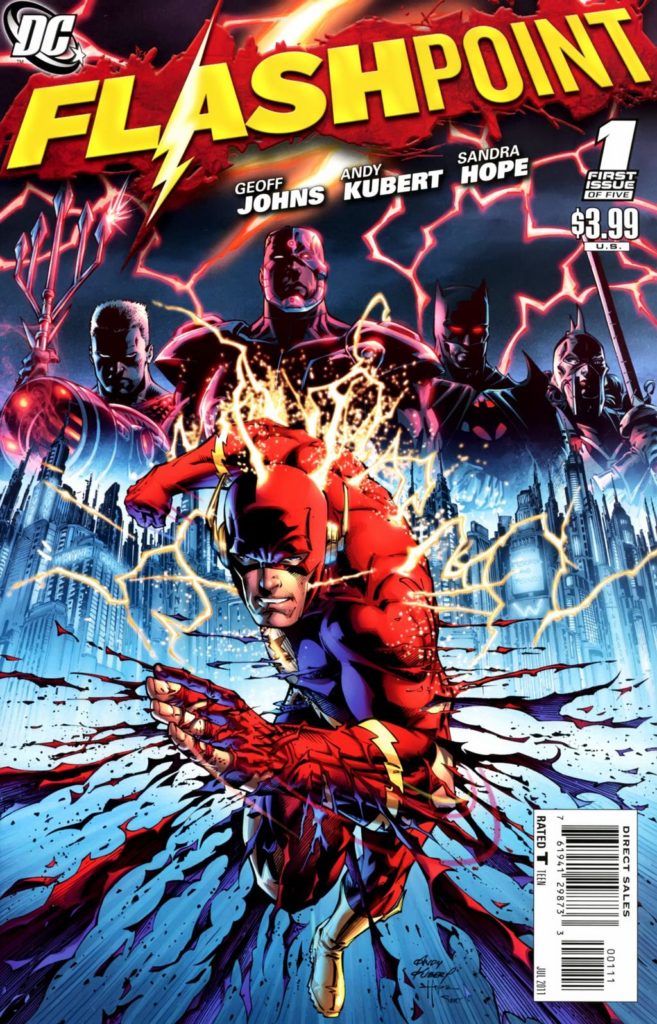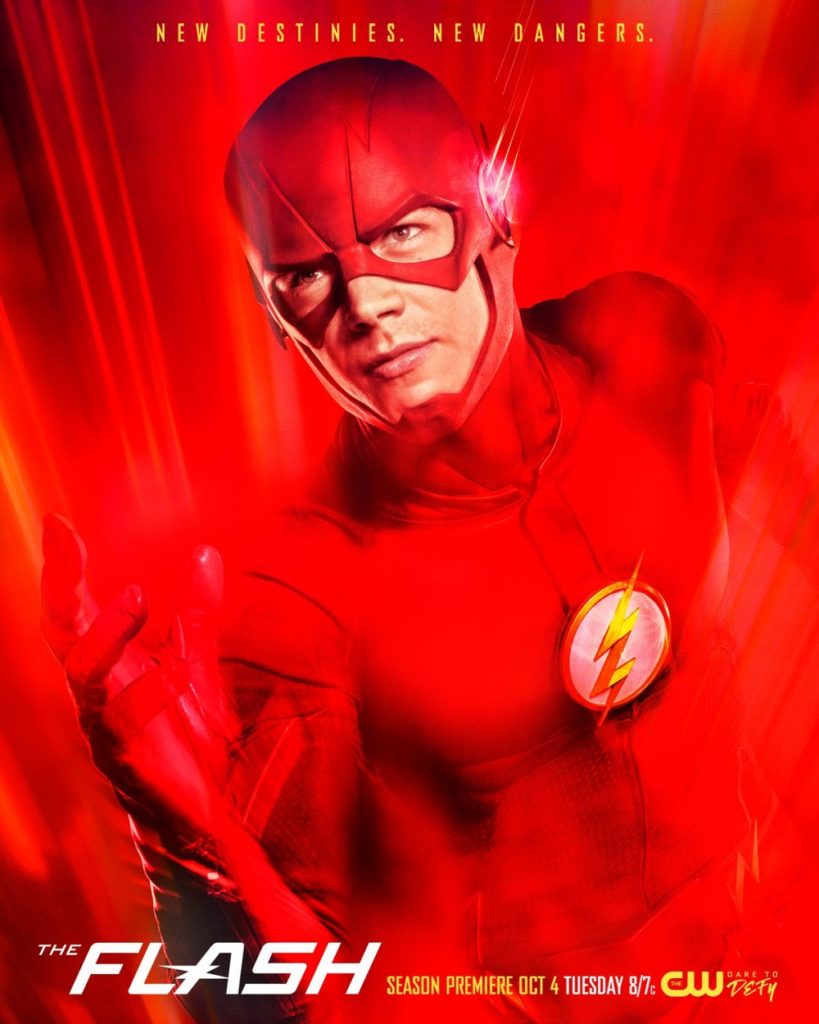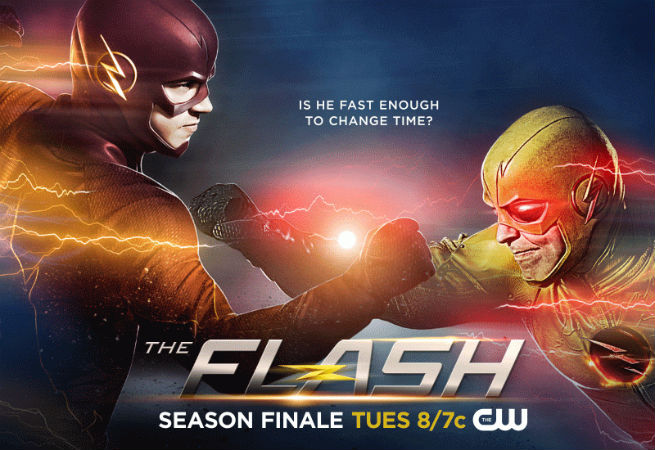Comics are a big deal in our house. When we heard CW’s The Flash was doing Flashpoint for season three, the news brought more than a little bit of excitement. For those of you who don’t read comics Flashpoint was a 5 issue DC crossover event starring The Flash. It’s one of DC comics most notable stories written by Geoff Johns in 2011. I would recommend reading Flashpoint‘s main arc if you’re a fan of show, even if you don’t normally read comics.
Adapting such a large and well-known story line is both a risk and a challenge. When done well, these stories will delight fans old and new. When done poorly, it will leave comic enthusiasts cold and newer television viewers confused. Thankfully, over the last several years, the CW has proven that showrunner Greg Berlanti and his team are up to the task. Now that we are well into the new season, let’s talk about how well the Flashpoint arc has landed.
Please note that this column will contain spoilers for the CW’s The Flash, including the current season as well as the Flashpoint event in the comics. If you’re looking to avoid spoilers, now would be a good time to get caught up and come back a little later.
Capturing the Essence

During the Flashpoint comic, Barry Allen (The Flash) wakes up to a very different world. His mother is still alive, he is not the Flash, the Justice League was never formed, and the world is at war. Eventually, Barry discovers that he has created this alternate universe by returning to the past to prevent the murder of his mother at the hands of the Reverse-Flash. In realizing the impact this decision had on the world, particularly the millions who died in the resulting war, he works to regain his powers and again returns to the past. This time to say goodbye to his mother and allowing her to die, thus repairing the timeline.
On the whole, this story line seems like it would have been more appropriate to do at the end of the first season. After all, most of the first season revolves around the death of Barry’s mother and its impact on his life. In fact, during the season one finale, Barry goes back in time for the express purpose of saving her. In the end, he chose not to, and we all thought that was the end of it. It wasn’t. At the end of season two, Barry revisits this moment in time and his original decision. This time he chooses to save his mother, creating the Flashpoint alternate universe.
There are several large differences between how the event is handled in the comics versus the television show. First and foremost is the tone of the alternate timeline. In the comics, the new timeline is quite dark, highlighting the earth shattering consequences of Barry’s decision. Whereas on television, the focus was on smaller, more personal changes leveraging the audience’s connection to other members of the cast. A good example of this is a now shattered relationship between Barry and adoptive father Joe West. It makes the changes more personal to the viewer. This works in its own way, and it’s probably more appropriate for the television medium.
My only real criticism of this is the high stakes in the comic served as a call to action for Barry. Both in terms of trying to fix the mess he’s made, but also in forcing him to come to terms with his mother’s death. What is one life or even two when weighed against millions? This is an easy calculation for a heroic character to make. Compare that to one life versus some changes to your relationships with other people, that’s a little more murky, especially when the lives in question are those of your parents. It makes the realization and the subsequent acceptance of his grief feel less genuine and more a product of the plot than any real personal revelation. Despite this change, I think this was still okay. Comics have a tendency ratchet everything to extremes to emphasize the stakes where television has to be more personal to connect with the viewer. The essence of the original piece is maintained, and that’s what’s the most important.
Temporal Changes
 That said, what the The Flashpoint Arc does best is to set up some alterations to the television timeline. As we approach the mid-season finale next month it’s easy to see that there are some interesting additions here. Tom Felton’s Julian Albert is my favorite new character on the show. I dare say, I love to hate him. It’s delightful whenever he comes on screen. I’m also a big fan of Dr. Alchemy. Even if he isn’t the “big bad” for the season, having an enigmatic and powerful adversary who is not a speedster is a welcome breath of fresh air. And let’s not forget that the Killer Frost storyline is clearly far from over. While a lot of these changes seem completely unrelated to the events Barry changed in Flashpoint, that’s okay. As someone who reads comics regularly, I am used to suspending disbelief in the name of good fun. Make no mistake, the changes they’ve made here are just that. Good fun.
That said, what the The Flashpoint Arc does best is to set up some alterations to the television timeline. As we approach the mid-season finale next month it’s easy to see that there are some interesting additions here. Tom Felton’s Julian Albert is my favorite new character on the show. I dare say, I love to hate him. It’s delightful whenever he comes on screen. I’m also a big fan of Dr. Alchemy. Even if he isn’t the “big bad” for the season, having an enigmatic and powerful adversary who is not a speedster is a welcome breath of fresh air. And let’s not forget that the Killer Frost storyline is clearly far from over. While a lot of these changes seem completely unrelated to the events Barry changed in Flashpoint, that’s okay. As someone who reads comics regularly, I am used to suspending disbelief in the name of good fun. Make no mistake, the changes they’ve made here are just that. Good fun.
The Reverse-Flash Paradox

The one fundamental failing of the Flashpoint Arc is the accidental creation of a time paradox — the cardinal sin of time travel. One, I might add, that takes the entire DC television universe continuity with it.
Didn’t catch it? Let me explain. In the season two finale, we see Barry travel into the past to stop the Reverse-Flash from killing his mother. He is successful. When next we find Barry, he’s returned to the present and living in the new timeline created by his actions. His parents are alive. He’s not the Flash. Perhaps more importantly, he’s happy. However, we soon discover he’s hasn’t come to this new timeline alone. After the events of the finale, he has captured and imprisoned the Reverse-Flash. Over the course of the first episode, we see Barry slowly come to realize that he’s made a mistake. That his desire to save his mother was selfish and has negatively impacted other people he cares about. Unfortunately, in this timeline he’s not the Flash and has lost his speed. Forced to turn to the Reverse-Flash for help, the two return to the past where the Reverse-Flash kills Barry’s mother, restoring the original timeline. He then politely drops him off in the present and runs off to cause mischief in DC’s Legends of Tomorrow.
Here is the problem: During season one of The Flash, we learn that after running back in time to kill Barry’s mother, the Reverse-Flash did not have enough speed left to time travel. This is confirmed for us by the Reverse-Flash AI companion Gideon who informs him that his journey back to this time from the 22nd century has drained his powers. This is the impetus for the entire plot of season one. Therefore, he can not run Barry back to the past in the first episode of season three. Worse, he is not trapped in the past.
This means he never pursues his plan to find a way back to his own timeline. Which means he never builds and blows the particle accelerator which is responsible for the creation of The Flash and all of the meta-human characters we see on the show. Without these actions there is no Flash TV show. Additionally since the DC television universe is linked wherever The Flash intersects with the other shows, the continuity folds in on itself.
Again, while I can forgive them in the spirit of good fun, this seems like a rather egregious error. One that was fairly easy to avoid in the writing room. Barry could have simply not lost his powers. Fixed.
Conclusions
All in all, Flashpoint’s execution was just okay. Its greatest success has been in implementing some fresh new characters and story hooks. If not for the Reverse-Flash paradox issue, I would have said it was very well done. Regardless, The Flash remains one of my favorite shows on television. It’s never been afraid to embrace the source material in a way that many shows based on comics avoid. After all, where else on television can you find a giant psychic gorilla or an enormous CGI manshark? Nowhere. In fact, the whole of the DC television universe is very well done. Even when it missteps, it’s still quite enjoyable.
What about you? Did you enjoy Flashpoint? What about the other DC shows journey to the upcoming mid-season finale’s.
 Tanner Meservier is a lot of things. Technical Director, Game Designer, Comic Enthusiast. Most of the time though he is just a loving husband to Nancy O’Toole Meservier at their home in Lewiston, Maine (AKA the Frozen North). His company Mythic Portal Games creates digital assets for virtual table tops and is working to release their first card game Steam Powered Sentinels in 2017. You can follow Tanner @MeserEngine on Twitter or at the Mythic Portal Games Facebook Page.
Tanner Meservier is a lot of things. Technical Director, Game Designer, Comic Enthusiast. Most of the time though he is just a loving husband to Nancy O’Toole Meservier at their home in Lewiston, Maine (AKA the Frozen North). His company Mythic Portal Games creates digital assets for virtual table tops and is working to release their first card game Steam Powered Sentinels in 2017. You can follow Tanner @MeserEngine on Twitter or at the Mythic Portal Games Facebook Page.

I’m hopelessly behind on the Flash, but I do enjoy the show. I can’t compare them to the comics since I’m not a comics reader, but I actually like the idea that the stakes of his time-tampering are smaller. It seems like it’d be an easier choice to make the personal sacrifice if everyone’s lives have been damaged, harder perhaps to make the heroic choice when the stakes are lower? Either way, chewy and interesting. I look forward to catching up.
The smaller consequences are also certainly more realistic. For most people our loss or presence would be felt significantly on a local scale. It’s the rare few whose life or death would shake up the world as significantly as was done in the comics. Thanks for taking the time to read the column and to leave a comment. Its certainly appreciated!